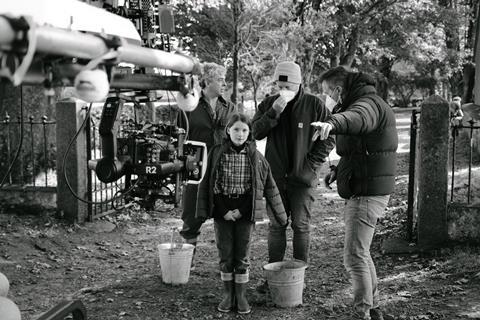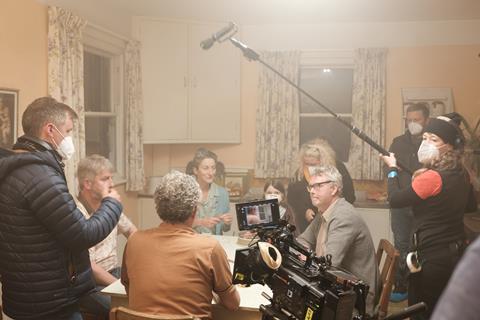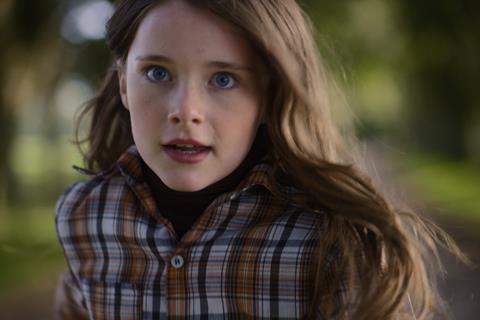Ireland had never scored an Oscar nomination for international feature film — until The Quiet Girl came along and seduced voters with its tender charms. Screen tracks the film’s journey from intimate family drama to Academy Awards contender.

For a low-budget film in the Irish language with no big stars, The Quiet Girl (An Cailín Ciúin) has certainly made its mark on the international film stage. It has become the highest-grossing Irish-language film of all time, following last year’s wins at the Berlin — where it premiered — and Dublin film festivals, and a sweep of prizes at the Irish Film and Television Awards (IFTAs).
On top of its two Bafta nominations, its most recent success is an Academy Award nomination for best international feature film, the first Irish-language title chosen for this category, beating off some stiff competition in the process.
The drama, about a lonely, neglected nine-year-old girl packed off one summer to live with some distant relatives in rural Ireland in 1981, is based on the 2010 short story Foster by Irish writer Claire Keegan, first published in The New Yorker. The simplicity of the tale and the emotional layers it contained struck a deep chord with Irish director Colm Bairéad, who was looking for a project to be his feature debut.
“I was deeply moved by the story,” says Bairéad. “All my shorts had focused on young protagonists, so I responded to it. The piece challenged me; it’s almost a miniature and it was the smallness of the story that appealed. [Filmmaker and critic] Mark Cousins said that art shows us again and again that if we look closely and openly at a small thing, we can see a great deal in it. I had that response to Foster when I read it. It touched on essential human truths. I found a kinship with Keegan’s writing and I could see the film forming in my mind while I was reading it.”
Setting up the $1.3m (€1.2m) project proved straightforward. Bairéad and his producing partner and wife Cleona Ní Chrualaoí applied to the Cine4 scheme — the development and production initiative for Irish-language films set up by broadcaster TG4, Screen Ireland and the Broadcasting Authority of Ireland — and the film was picked in 2019. “It’s guaranteed funding so we didn’t have to worry about financing,” says Ní Chrualaoí. “We had a long background in Irish-language films, so when the scheme was announced, applying felt like a no-brainer.”
One challenge, however, was casting. Given only 2% of Ireland’s population speaks Irish on a daily basis, the pool of actors to pick from is small. “Luckily there’s a network of Irish-language primary and secondary schools, and that’s where we found Catherine Clinch,” says Ní Chrualaoí.
“From first audition tape, we saw Catherine had a dignity that felt appropriate,” says Bairéad. “She had an understanding that Cait was a character who had learned to push all her emotions inwards and was guarded. I always told her not to be afraid to hide her emotions and that the camera would pick up on the most minute thing, so it’s best to feel things but not to show it to us. For someone who’d never acted in front of a camera, she had a great understanding.”
The shoot

Filming took place over 25 days during the summer of 2020. “Covid was still very much a presence then, and people were reluctant to open their doors and let strangers in, so our location manager had quite a difficult time,” says Ní Chrualaoí.
“We found a location in County Meath, where I grew up, and then through the local funeral director who I know — because who else is going to best know all the houses locally? — we found the house which was the family house. Then we found the house for the Kinsellas [who take in Cait], which was a time capsule from the 1950s with original furniture and furnishings that we kept in the film.”
The filmmakers had always set their eyes on Berlin 2022 as the launch, because the festival’s Generation strand seemed a natural home for the film. The timing was just right and, with festival veteran and producer Rosa Bosch on board as a consultant, they got the slot they wanted. With one award from Berlin — the Generation Kplus international jury prize for best film — The Quiet Girl then had its Irish launch at Dublin International Film Festival a week later. At the IFTAs in March, to Bairéad and Ní Chrualaoí’s surprise, the film overcame formidable competition, including from Kenneth Branagh’s Belfast, and scooped seven awards, including best film, director and actress.
Break Out Pictures already had UK and Irish rights since autumn 2021 and started to plan the UK and Irish release. It brought on Curzon to be the UK distributor, and a simultaneous release in May 2022 was set. London-based Bankside Films joined the team in July to handle international sales.
“We had a great relationship with Break Out and Curzon, and were heavily involved in the release strategy,” says Ní Chrualaoí. “We had this huge profile before the film was even released because of the IFTAs and the Berlin win so it was a huge film in Ireland, perhaps not so much in the UK. The IFTAs brought huge publicity. We were on [Ireland’s biggest talk show] The Late Late Show and once you get on that, the whole country knows who you are.”
The Quiet Girl, which has returned to wide play in Ireland on the back of the Oscar nomination, went on to become the highest-grossing Irish-language film of all time around the world, and the first Irish-language drama to crack £1m ($1.2m) at the UK/Ireland box office. In Australia and New Zealand, it has taken a$1m ($690,000).
Atlantic crossing

The next move was the US release and the campaign for the Oscars. Super, the boutique label of US production and distribution company Neon, acquired US rights in September. “We had a lot of interest from US distributors,” says Ní Chrualaoí. “We felt Super were on point in terms of strategy and experience, and they had really thought the film through. They had experience with bringing Bosnian war drama Quo Vadis, Aida? to the [2021] Oscars. We felt in safe hands with them.”
Super hired awards strategist Steven Raphael of Required Viewing, and the Oscar campaign began immediately with screenings for Academy members in New York and Los Angeles. “We’ve been four times since October and we’ve been loving it,” says Ní Chrualaoí. “It’s our first feature, and it’s so lovely hearing how moved people are by the film.”
Dan O’Meara and Darcy Heusel, co-heads of Super, say Bairéad and Ní Chrualaoí’s passion for the film has given the campaign an extra fillip. “The Quiet Girl is a love letter to their country, language and family, and that comes though when you meet them,” they say jointly. “The film rewards patience and observation, and we built a campaign that played to its strengths.”
Super hosted screenings in small, intimate settings and had the filmmaker pair on hand to talk with voters afterward. “Those conversations often went on for hours.”
From autumn until the end of 2022, the team built up the film’s profile with screenings at US festivals including Newport Beach, Montclair, Denver, Film Fest 919 in North Carolina, Palm Springs and Santa Barbara, winning several audience awards along the way. It was facing tough competition in the Oscars race, with the likes of Cannes winners Corsage and Decision To Leave and Venice-launched Bardo all, by mid-December, on the shortlist for best international feature.
“Word started getting back to us that voters were seeing The Quiet Girl and word was spreading,” say the Super co-heads, going on to compare the experience to their 2020 campaign for Tamara Kotevska and Ljubomir Stefanov’s Honeyland, which was the first documentary to be nominated for both documentary and international feature at the Oscars. “Everyone seemed to feel they discovered the movie themselves and it gave them a sense of ownership in its success.”
Raphael of Required Viewing points to the international committee members’ passion for this opt-in Oscar category, which helps create a level playing field for films. “They devote a lot of time to watching and analysing these films,” he says. “They have their own point of view and do not want to be dictated to as to which films they should be voting for. They often vote from an emotional place — and obviously The Quiet Girl is all emotion.”
Working with Super, Raphael and his colleague Denise Sinelov kept the momentum going with screenings and Q&As in Los Angeles, New York and London, all leading up to the February 24 US release a week before final voting begins on March 2. “We could see how passionately members reacted to this sensitive, heartfelt story,” he explains. “Every year there’s a ‘little engine that could’ film that tries to make its way to the top and this year it’s The Quiet Girl. It spoke to Academy members in a way that some of the other higher-profile films did not.”
The strategy paid off. The Quiet Girl outflanked some much-fancied rivals, and earned an Oscar nomination alongside All Quiet On The Western Front, EO, Close and Argentina, 1985 all representing countries — respectively Germany, Poland, Belgium and Argentina — with a strong track record of either winning or being nominated.
The nomination was greeted with cheering and popping champagne corks in Ireland — or at least in the Dublin cinema that Ní Chrualaoí and Bairéad had hired to watch the announcement with the whole cast and crew.
The sense of pride and excitement at the film’s achievement has come with some pressure. “There were such high expectations in Ireland for the film, so I did feel the pressure,” says Ní Chrualaoí. “The morning of the nomination, I was feeling the weight of expectation and I didn’t want to let down the country.”
“For the country and for the language we thought this would be such a beautiful thing,” adds Bairéad. “There haven’t been that many Irish-language films. So perhaps it’s being a minority language — and the only minority-language film on the shortlist — stood in its favour.
“We are very proud because this watershed moment is helping reframe the conversation about attitudes to the language and giving people a confidence and willingness to re-engage with the language.”
The Oscar nomination for The Quiet Girl comes in a year that represents a high watermark for Ireland at the US Academy Awards, including Aftersun’s Paul Mescal, Northern Irish short An Irish Goodbye and multiple nominee The Banshees Of Inisherin, whose star Brendan Gleeson Bairéad recalls meeting as a teenager when his father was teaching the actor how to speak Irish. “It’s quite a moment for Irish cinema,” says the director. “And an honour for The Quiet Girl to play its part alongside these wonderful Irish nominees.”

























No comments yet